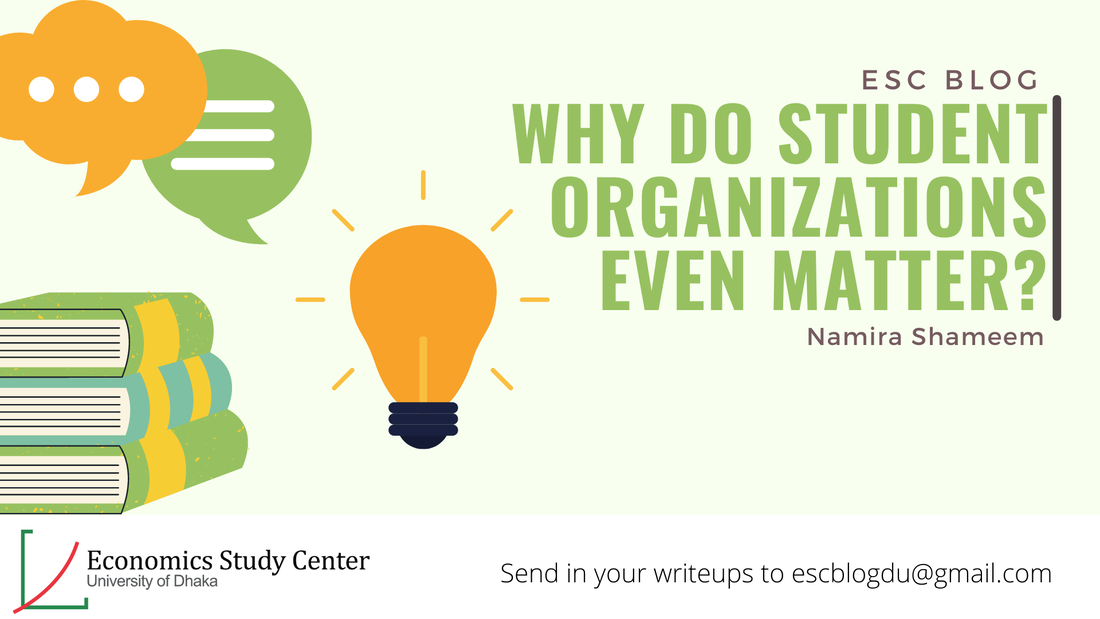ECONOMICS STUDY CENTER, UNIVERSITY OF DHAKA
|
by Namira Shameem From early days, humans have subsisted on forming groups and communities, whether it be for strategic reasons, or mere kinship and connection. The threads tying people have gotten more entangled as we evolved from mere groups of hunters and gatherers to families, friends, and societies. As we begin each critical phase of our lives, we encounter people and forge networks that nudge, nourish and nurture us, shaping our mindsets and beliefs. As university students, finding a community involves becoming part of friend circles, student organizations, and/or societies that help us thrive intellectually, equip us with skills to help us learn and grow, or merely provide us with friendships and a sense of belonging. Initially, mere conversations with like-minded individuals suffice as an incentive to partake in such clubs. But more tangible outcomes also lure us into these societies and motivate us to pursue this quest of knowledge-building and knowledge-sharing. Firstly, from personal experience, being linked to a student club has fed my interest in Economics and played a significant role in fuelling my academic growth. Immersing myself in this world, I finally began to grasp the meaning behind the jargon and comprehend the concepts of economics. This learning continues as we become exposed to more writing, hear from more experts through the discussions we organize and the content we produce. In pre-pandemic days, club activities were greater motivation to attend lectures than the classes themselves, despite the 2.5-hour commutes to and from campus. Research (cited below) indicates that student involvement in clubs and organizations lead to higher chances of degree completion and persistence. And although success is subjective, other studies have found involvement in student-led clubs and forums to result in student’s success and higher achievements. Secondly, being part of a student organization exposes you to individuals from varying fields – professionals ranging from business people, bankers to journalists, researchers, academicians and policymakers. It leads us to connect better with our professors, as well as with peers with similar interests. Developing sustainable social ties and building a network can not only jumpstart careers, but also make us privy to knowledge, feedback, and support systems that we would otherwise not have. Facilitating and engaging in stimulating conversations and questioning people to feed our curiosities is vital for personal progress. For example, asking questions during a seminar and later connecting with the panelist or corresponding via email may reveal new opportunities. Thirdly, student organizations or clubs can greatly enhance one’s soft skills. Participating in club activities requires a myriad of skill sets, including doing effective (Google) search and research which promotes analytical thinking, creating designs or graphics which enhances our sense of aesthetics and creativity or carrying out tasks to put together events that test our organizing capabilities. All of this reflects our sense of responsibility and leadership abilities. From more obvious skill building such as learning new software, learning to tailor each piece of writing to its purpose (such as drafting emails or writing blog posts), we learn to adopt a more nuanced understanding of matters. What is the most pressing issue we need to speak to? Which panelist is an expert on this issue that we would love to hear from? What is the most appropriate medium and tone to convey a certain message? How do we pick up on subtle cues from our audience? These are skills that develop subconsciously as we work and gain more experience. Personally, I had little idea on designing or producing content before ESC. I had little experience in participating in panel discussions and next to none in producing publications on InDesign. Nor was I familiar with specialists in this field in Bangladesh before joining ESC. Being a part of the club has had a self-perpetuating effect: the more I worked on something, the more I learnt and the deeper my interest grew and so the more I worked. In addition, it is truly humbling to hear from experts and even more rewarding to see them appreciate our work! While these incentives still stand, other pull factors have garnered strength to propagate students towards different areas. As days go by, time has become an increasingly scarce commodity. As even nascent students of economics will know, with scarcity comes the need for efficient allocation of resources. The opportunity cost of such time spent volunteering in club activities could perhaps be precious hours devoted to studying, or even towards the burgeoning world of part-time jobs, internships, or freelancing gigs. This, alongside the mental toll that the pandemic has imposed on students, the uncertainty permeating our lives and the growing concern regarding late graduations and its possible impacts on future careers, has contributed to the dissipating enthusiasm of students. At one point, we begin to question why club participation matters, or what is even the point of it all. Especially when so much is raging in the real world, why should being part of a club and writing a blogpost even count? As we continue to grapple with these questions, we must remember the privilege that being part of such communities offers us. While it is entirely voluntary, participation in club activities demonstrates a genuine interest in learning and can speak to our employability. Leaving aside personal gains, as a student body with a modest audience base, we have the platform to organize conversations and host dialogues on issues that matter. While we may not yet be able to do much, we can seek to understand the problems and the possible pathways to solution. What we can do is try to bridge the gap, even if by a little, between students and experts, between an audience who understands with those who seek to understand, and thereby, play our roles in fostering growth and in the process, grow ourselves. Citations:
1 Comment
Shabab Anjum Khan
11/21/2021 09:57:17 pm
Wonderfully written! Great insight. Looking forward to engaging with more content from ESC.
Reply
Leave a Reply. |
Send your articles to: |


